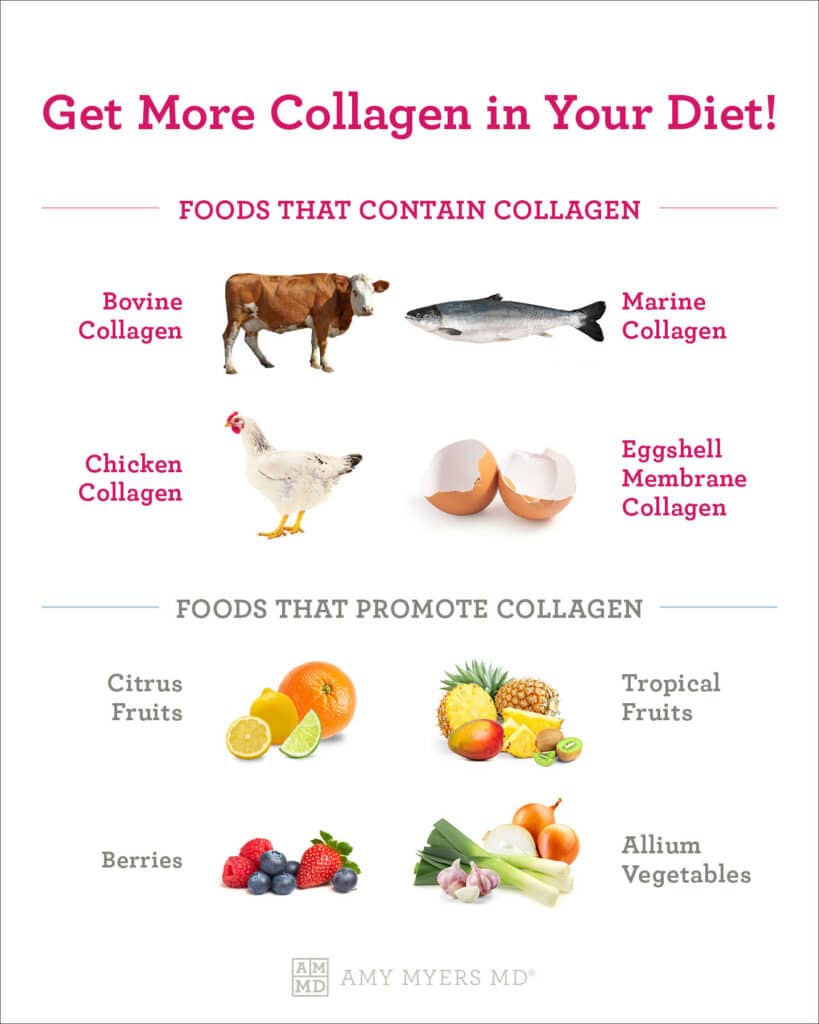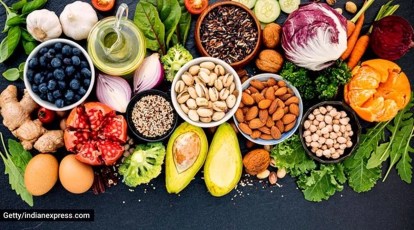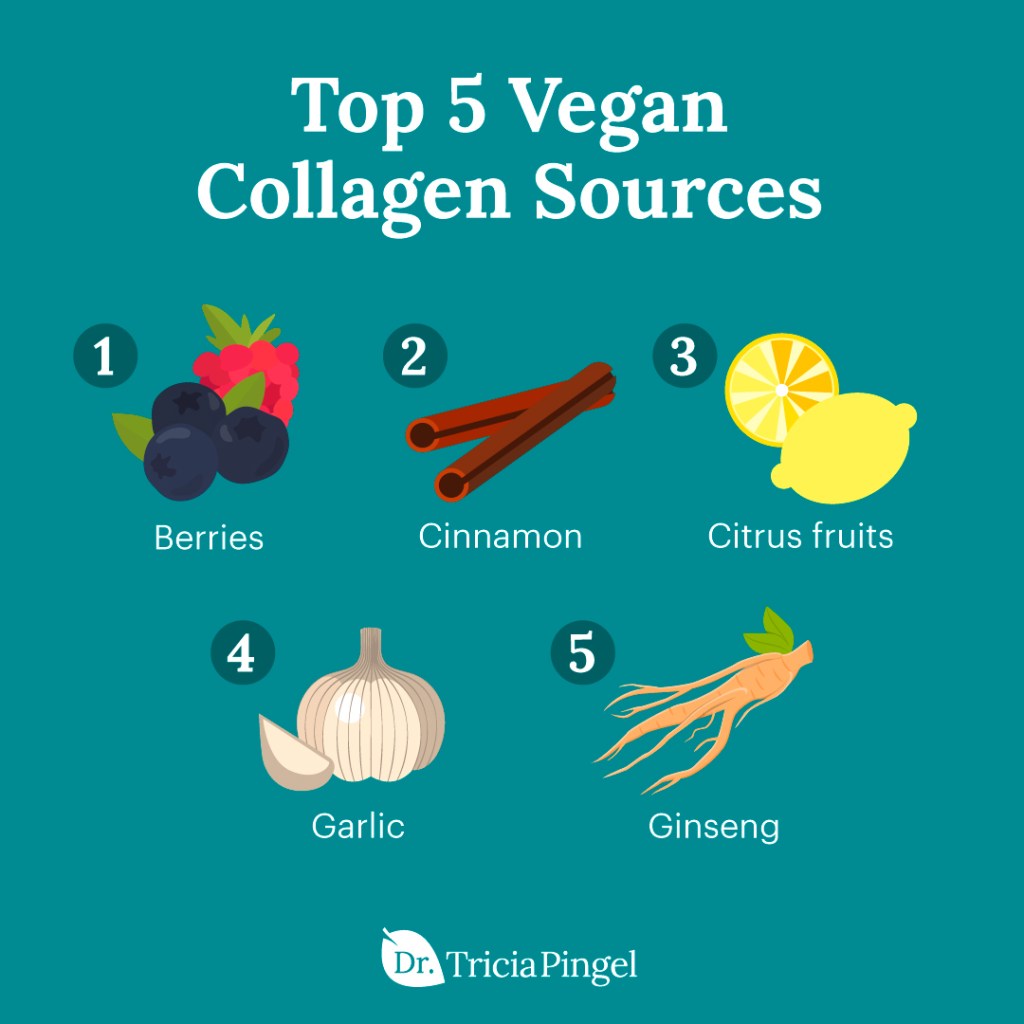Plant Based Collagen Sources, nuts, seeds, and whole grains. These ingredients provide essential amino acids for collagen production in the body.
Plant sources can be an excellent alternative for those seeking collagen without animal products. Now, the demand for collagen supplements derived from plant-based sources is on the rise. With multiple options available in the market, individuals can choose from powders, capsules, and drinks to boost their collagen intake.
These supplements not only support skin health and joint function but also contribute to overall well-being. Understanding the diversity and benefits of plant-based collagen sources can help individuals make informed choices for their nutritional needs.
The Benefits Of Plant-based Collagen
Promotes Skin Health Naturally
Plant-based collagen offers a plethora of benefits, particularly in promoting skin health. The natural plant-derived collagen boost assists in maintaining skin elasticity and hydration, ultimately reducing the appearance of fine lines and wrinkles. With its antioxidant properties, plant-based collagen helps in shielding the skin from free radicals, leaving it looking radiant and youthful.
Supports Joint And Bone Health
When it comes to supporting joint and bone health, plant-based collagen is a standout performer. Its essential amino acids, vital for maintaining bone density and joint flexibility, help reduce the risk of age-related ailments such as osteoporosis and arthritis. Moreover, it aids in repairing and regenerating connective tissues to ensure stronger joints for enhanced mobility.
Boosts Hair And Nail Strength
Plant-based collagen provides a natural solution for boosting hair and nail strength. With its amino acids and proteins, it fortifies hair follicles and nourishes nail beds, leading to healthier hair and stronger nails. Additionally, regular intake of plant-based collagen helps prevent hair loss and promotes nail growth, thereby enhancing overall hair and nail quality.

Credit: www.amymyersmd.com
Key Sources Of Plant-based Collagen
Plant-based collagen sources include algae, soy, and legumes, which are rich in amino acids crucial for skin health. These botanical alternatives boost collagen production naturally and support overall well-being.
Fruits And Vegetables
Fruits and vegetables rich in Vitamin C and antioxidants
- Citrus fruits: Oranges, lemons, and strawberries
- Green leafy vegetables: Spinach and kale
- Berries: Blueberries and raspberries
Seeds And Nuts
Seeds and nuts are packed with essential fatty acids and protein
- Chia seeds: Rich in omega-3 fatty acids
- Almonds: Good source of protein
- Flaxseeds: High in fiber and lignans
Legumes And Beans
Legumes and beans filled with amino acids and minerals
- Lentils: Great source of iron and protein
- Chickpeas: High in fiber and folate
- Black beans: Rich in antioxidants and fiber
Supplements And Powders
Plant-based supplements and powders for added collagen support
- Collagen powders: Derived from plants like algae and legumes
- Collagen-boosting supplements: Including Vitamin C and hyaluronic acid
- Protein powders: Blended with collagen peptides for added benefits
Integrating Plant-based Collagen Into Your Diet
If you follow a plant-based diet and want to boost your collagen intake, there are plenty of delicious and nutritious options available. Incorporating collagen-rich foods into your daily meals is a great way to support your skin, joints, and overall health.
Here are some collagen-rich foods you can easily integrate into your diet:
- Soy products: Tofu, tempeh, and edamame are all excellent sources of plant-based collagen.
- Legumes: Chickpeas, lentils, and beans are packed with collagen-boosting nutrients.
- Nuts and seeds: Almonds, walnuts, chia seeds, and flaxseeds are all rich in collagen production-supporting nutrients.
- Leafy greens: Spinach, kale, and other leafy greens are high in collagen and provide other essential vitamins and minerals.
- Fruits: Berries, citrus fruits, and tropical fruits like papaya and pineapple contain vitamins and antioxidants that support collagen synthesis.
- Omega-3-rich foods: To boost collagen production, incorporate foods like avocados, hemp seeds, and chia seeds into your meals.
Now that you know which foods to include in your diet to boost collagen production, let’s explore some creative ways to incorporate them into your meals. Here are a few simple and delicious recipes to get you started:
- Chickpea and Spinach Salad: Toss together chickpeas, spinach, cherry tomatoes, cucumbers, and a drizzle of olive oil and lemon juice for a refreshing collagen-boosting salad.
- Tofu Stir-Fry: Sauté your favorite vegetables and tofu in a flavorful sauce made with soy sauce, ginger, garlic, and sesame oil. Serve over brown rice or quinoa.
- Collagen-Rich Smoothie: Blend almond milk, a handful of berries, a scoop of chia seeds, and a tablespoon of almond butter for a collagen-boosting smoothie to start your day.
- Vegan Lentil Soup: Cook lentils with carrots, celery, onion, and vegetable broth to create a hearty and collagen-rich soup.
- Avocado Toast: Mash ripe avocado onto whole-grain toast and top with hemp seeds for a satisfying and collagen-boosting breakfast or snack.
When incorporating plant-based collagen into your diet, it’s essential to understand your dietary needs and ensure you’re getting a balanced intake of nutrients. Consider the following factors:
- Protein: Ensure you’re consuming enough plant-based protein sources to support collagen production and overall health.
- Omega-3 fatty acids: Include foods rich in omega-3 fatty acids to promote collagen synthesis and reduce inflammation.
- Vitamin C: Pair collagen-rich foods with vitamin C sources to enhance collagen absorption in the body.
- Iron: Plant-based collagen sources like legumes and leafy greens also provide iron, which is essential for overall health.
- Hydration: Stay hydrated to support collagen production and maintain healthy skin.
By understanding your specific dietary needs, you can ensure a well-rounded and collagen-supportive plant-based diet.
Factors To Consider Before Choosing A Plant-based Collagen Product
Before selecting a plant-based collagen product, consider various factors such as the source of collagen, certifications for authenticity, and additional ingredients for overall health benefits. Differentiating these factors will help you make an informed choice when opting for plant-based collagen sources.
The market for plant-based collagen products has been booming recently, with many people looking for alternative sources to animal-based collagen. However, before jumping on the plant-based collagen bandwagon, there are a few essential factors to consider. These factors will help you choose a product that is not only effective but also aligns with your values and lifestyle. In this article, we will explore the key factors to consider before choosing a plant-based collagen product.
Quality And Purity
When it comes to plant-based collagen products, quality and purity should be your top priorities. You want to make sure that the product you choose is made from high-quality ingredients that have been carefully sourced and processed. Look for products that use organic and non-GMO ingredients to ensure that you are getting the best possible collagen source. Additionally, check for any third-party testing or certifications that can vouch for the quality and purity of the product.
Certifications And Labels
Certifications and labels can provide valuable information about a plant-based collagen product. Look for certifications such as USDA Organic, Vegan, and Non-GMO Project Verified. These certifications guarantee that the product meets specific standards and has been independently verified. Additionally, labels like “Ma”e in the USA” c”n give you confidence in the product’s manufacturing and sourcing practices.
Allergen Information
If you have allergies or dietary restrictions, it’s essential to consider the allergen information of a plant-based collagen product. Check the product’s label for potential allergens such as soy, gluten, or nuts. If you have any specific dietary requirements, make sure to choose a product that aligns with those needs.
Sustainability And Ethical Sourcing
For many people, sustainability and ethical sourcing are essential considerations when choosing any product, including plant-based collagen. Look for products that use sustainably sourced ingredients and support fair-trade practices. Supporting brands that prioritize sustainability and ethical sourcing ensures that you are making a positive impact on the environment and the communities involved in the production process. Consider these factors before choosing a plant-based collagen product to ensure that you are making the best choice for your health, values, and lifestyle. Remember to prioritize quality, look for certifications and labels, check allergen information, and choose products that promote sustainability and ethical sourcing. By considering these factors, you can find a plant-based collagen product that is not only effective but also aligns with your individual needs and values.
Maximizing The Absorption Of Plant-based Collagen
When it comes to plant-based collagen sources, maximizing absorption is critical to reap the full benefits. Fortunately, there are various strategies you can implement to enhance the absorption of this vital nutrient. In this article, we will explore three practical approaches: pairing collagen sources with vitamin C, avoiding inhibitors of collagen absorption, and utilizing digestive health aids. By incorporating these practices into your routine, you can ensure that your body is absorbing the maximum amount of plant-based collagen for optimal health and wellness.
Pairing Collagen Sources With Vitamin C
One of the most effective ways to boost the absorption of plant-based collagen is to pair it with vitamin C. Vitamin C plays a crucial role in collagen synthesis and is essential for the production of healthy skin, joints, and connective tissues. When consumed together, collagen sources and vitamin C work synergistically to enhance collagen absorption and promote overall collagen production. Some excellent plant-based sources of vitamin C include citrus fruits, strawberries, kiwi, pineapple, and bell peppers. Additionally, you can consider incorporating a vitamin C supplement into your daily routine to ensure you are meeting your needs. Remember, a little vitamin C can go a long way in maximizing the benefits of plant-based collagen.
Avoiding Inhibitors Of Collagen Absorption
While it’s essential to consume collagen sources and vitamin C, it’s usually necessary to avoid substances that can inhibit collagen absorption. Some common inhibitors include caffeine, alcohol, refined sugars, and high levels of stress. These factors can interfere with collagen synthesis and hinder its absorption in the body. To maximize the absorption of plant-based collagen, it is essential to minimize or eliminate the consumption of these inhibitors. Instead, focus on incorporating collagen-friendly foods and beverages into your diet, such as green leafy vegetables, berries, nuts, seeds, and herbal teas.
Utilizing Digestive Health Aids
Another effective way to maximize the absorption of plant-based collagen is to support your digestive health. A healthy digestive system ensures that nutrients are properly absorbed and utilized by the body. To optimize digestive health, consider incorporating digestive aids such as probiotics, digestive enzymes, and fiber-rich foods into your diet. Probiotics promote a healthy gut environment, while digestive enzymes aid in the breakdown and absorption of nutrients. Additionally, consuming fiber-rich foods helps regulate bowel movements and supports a healthy digestive system. By prioritizing digestive health, you can enhance the absorption of plant-based collagen and maximize its benefits.
Maximizing the absorption of plant-based collagen is crucial for obtaining the full range of benefits this nutrient offers. By pairing collagen sources with vitamin C, avoiding inhibitors of absorption, and utilizing digestive health aids, you can ensure that your body receives the optimal amount of plant-based collagen. Incorporate these strategies into your daily routine to support healthy skin, joints, and overall well-being.

Credit: indianexpress.com
Incorporating Plant-based Collagen Into Your Skincare Routine
Enhance your skincare routine with plant-based collagen sourced from natural ingredients like fruits, vegetables, and seeds. Boosted with antioxidants and phytonutrients, plant-based collagen helps promote skin elasticity and firmness, providing a natural solution for a radiant complexion. Incorporate plant-based collagen into your daily skincare regimen for healthy, glowing skin.
Collagen is a crucial protein that plays a vital role in maintaining the firmness and elasticity of the skin. While collagen is naturally produced in the body, its levels decrease as we age, leading to signs of aging such as wrinkles and sagging skin. Incorporating plant-based collagen into your skincare routine can help support the body’s structural collagen production and contribute to healthier, more youthful-looking skin.
Diy Collagen-infused Skincare Products
Creating your collagen-infused skincare products at home can be a fun and cost-effective way to incorporate plant-based collagen into your routine. Mixing natural ingredients such as avocado, aloe vera, and chia seeds with plant-based collagen supplements can create nourishing face masks and moisturizers that promote collagen production and enhance skin elasticity.
Choosing Collagen-enhanced Beauty Products
When selecting skincare products, look for those that contain plant-based collagen or ingredients that support collagen production, like vitamin C, retinoids, and peptides. Opt for serums and creams with natural plant extracts and antioxidants, as these can also help protect the skin from environmental damage and aid in collagen synthesis.
Understanding ColCollagen’sle In Skincare
Collagen is essential for maintaining the skiskin’s structure and strength, and its decline leads to the visible signs of aging. By including plant-based collagen in your skincare routine, you can help support the body’s structural collagen production and keep your skin looking healthy and youthful. By incorporating plant-based collagen into your skincare routine, you can promote collagen synthesis, improve skin elasticity, and reduce the appearance of wrinkles and fine lines. Whether through DIY skincare products or carefully chosen beauty products, embracing plant-based collagen can help you achieve radiant and youthful-looking skin naturally.
Addressing Common Myths And Misconceptions About Plant-based Collagen
As plant-based diets gain popularity, so does interest in plant-based collagen. However, various myths and misconceptions surrounding plant-based collagen sources need to be addressed. In this section, we will delve deeper into the vegan vs. animal-based collagen debate, explore the effectiveness of plant-based collagen, and understand the role of amino acids in collagen production.
The Vegan Vs. Animal-based Collagen Debate
The debate between vegan and animal-based collagen revolves around misconceptions about collagen’s sources. Many people believe that collagen can only be obtained from animal products, but this is not entirely accurate. Plant-based collagen substitutes, such as fruits, vegetables, and legumes, can also contribute to collagen production in the body, thereby challenging the notion that collagen must come from animal sources.
Effectiveness Of Plant-based Collagen
Plant-based collagen sources can be equally effective for maintaining healthy skin, hair, and joints. Contrary to common misconception, they provide essential nutrients and antioxidants that support collagen synthesis and overall skin health. Additionally, these sources contribute to a sustainable and ethical approach to collagen production, making them a viable option for individuals seeking non-animal-derived collagen alternatives.
Understanding The Role Of Amino Acids In Collagen Production
Amino acids play a crucial role in collagen production, and plant-based diets can provide a rich array of amino acids necessary for the synthesis of collagen. By incorporating a variety of plant-based protein sources into one’s set, individuals can ensure that their bodies have the building blocks required for collagen production, debunking the misconception that only animal proteins can support collagen formation.
Seeking Professional Guidance For Plant-based Collagen Consumption
When it comes to incorporating plant-based collagen sources into your diet, seeking professional guidance is essential. Consulting experts can help you make informed decisions tailored to your individual health needs. Here are some key ways you can benefit from professional guidance:
Consulting A Registered Dietitian Or Nutritionist
Registered dietitians and nutritionists can provide personalized advice on plant-based collagen sources suitable for your dietary requirements.
Collaborating With Skincare Experts
Skincare experts can offer insights on how plant-based collagen consumption can benefit your skin health and overall well-being.
Understanding Individualized Health Needs
Professional guidance helps you understand your unique health needs and ensure that your consumption of plant-based collagen aligns with your overall wellness goals.

Credit: drpingel.com
Plant Based Collagen Sources; Frequently Asked Questions
What Is The Best Source Of Plant-based Collagen?
Supplements like Collagen Fit, Multi-Collagen Belly Burn, and Organifi are the best sources of plant-based collagen. These supplements offer various benefits, including bone and joint support and support for hair, skin, and nails.
What Plant Is High In Collagen?
One plant high in collagen is aloe vera. It promotes collagen production and overall skin health.
What Plant Food Is Rich In Collagen?
Plant-based foods rich in collagen include legumes, tofu, tempeh, chia seeds, and leafy greens.
How Do Vegans Get Collagen?
Vegans can get collagen from plant-based sources like beans, nuts, seeds, and supplements.
Conclusion
Discovering plant-based collagen sources can revolutionize your skincare routine and overall well-being. By incorporating these natural alternatives, you nourish your body from within, promoting lasting radiance and vitality. As you explore these options, remember that nature provides us with abundant resources to thrive.
Embrace the power of plant-based collagen sources today.






